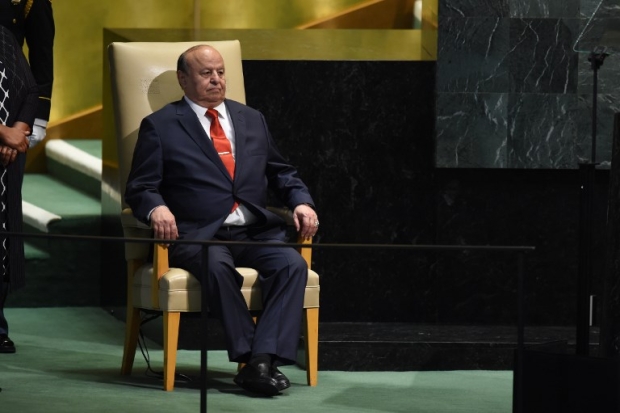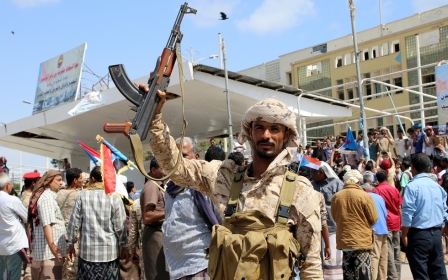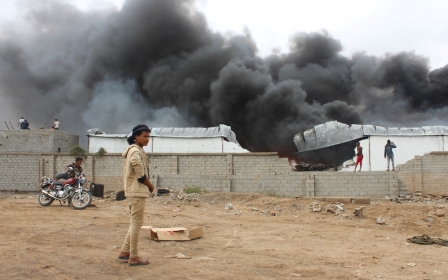ANALYSIS: Saudi Arabia plays puppet master as Yemen slowly breaks apart

Saudi Arabia quietly allowed the takeover of Aden by southern separatists and backed their push for independence but held them back from finishing President Abd Rabbuh Mansour Hadi's government due to the legitimacy he gives the Saudi's coalition in Yemen, activists and separatist sources have said.
Fighting in the southern city this week left Hadi's government cowering in the presidential palace - guarded by Saudi troops - and the UAE-backed Security Belt militia in full control.
The Saudi coalition promised to help us achieve independence in the south ... We trust them and this encourages us to obey
- Southern Transitional Council source
The Security Belt later yielded many of its gains, including public institutions, and publicly backed Hadi at the behest of Emirati and Saudi mediators. But they remain the pre-eminent force in the city.
While the Emiratis and the Saudis were ostensibly on opposing sides, analysts, activists and members of the Security Belt's political wing, the Southern Transitional Council, say the takeover was accepted by all in the coalition.
That consent, if true, betrays a shift in the motivations of the Saudi-led coalition and support for a movement that could lead to the break-up of the sovereign state of Yemen.
"The Saudi coalition promised to help us achieve independence in the south, peacefully," a high-level source in the council told Middle East Eye.
"The Saudi and Emirati envoys intervened to prevent further bloodshed and promised Hadi's government would change. We trust them, and this encourages us to obey."
A puppet president?
The source added that the council still supported Hadi, who remains in self-enforced exile in Riyadh, but it was his corrupt government in Aden, led by Prime Minister Ahmed Obaid bin Daghar, they wanted shot of.
"Our aim was not to create a riot in Aden. Our forces did not want to kill southerners, and they did not want to fight Saudi forces inside the palace," he said.
The aftermath of the fighting has been littered with pledges that all belligerents are still on the same side and support the recognised president.
The STC's leader, Aidaroos al-Zubaidi, told France 24 Arabic TV on Tuesday that he remained loyal to Hadi, despite the fact he had routed his men, and would continue to oppose the Houthis.
On Friday the UAE's foreign minister, Anwar Gargash, said on Twitter: "It's important to confirm to those who like creating division that the UAE's position is the mirror image of the Saudi stance.
"We are building a strategic partnership to overcome the Yemeni crisis."
But facts on the ground are this: Hadi has now lost two capitals - first Sanaa, which he fled when it was overrun by the Houthi movement in February 2015, and now Aden, which he fled a month after the fall of Sanaa.
However, his international legitimacy due to his election in 2012 still works for the Saudis. Their stated aim on entering Yemen was to restore the elected president to the capital and roll back the Iranian-supported Houthi movement.
Losing him now, even as a figurehead, could prove disastrous to the coalition's own reasons for its war, according to political activist Mohammad al-Yusofi. Ending his tenure would end the coalition.
"The southerners and the Saudi-led coalition are against Hadi, but they cannot criticise him because he gives them legitimacy to stay - he asked them to intervene in Yemen to fight the Houthis," he said.
"You cannot find any photo of Hadi in the public institutions in Aden. All you find are photos of UAE and Saudi leaders, and this means separatists do not want Hadi, despite him being president of the whole country."
So, while the coalition publicly supports Hadi as a figurehead in exile, privately - as Aden has shown - they side with the strongest group on the ground.
Ibrahim al-Suhaibi, a former journalist and political analyst, said the Saudis control the coalition and no ally could act without Riyadh's input.
"The Saudis could have stopped the clashes in Aden in the first minutes. They did not because the clashes were against the prime minister and not Hadi."
Coalition-engineered crisis
Suhaibi said the Saudis and Emiratis had created the crisis in Aden as a by-product of their meddling in the affairs of Yemen.
With the backing of Riyadh, the UAE created, trained and armed the Security Belt in the full knowledge of its political aims.
"The Saudi-led coalition should close the military camps of separatists in Aden because they are illegal camps and [despite public pronouncements] they are not loyal to Hadi," he said.
Supporting armed groups like the Security Belt is against the aims of the Saudi-led coalition
- Ibrahim al-Suhaibi, political analyst
He said the expedience of having heavily armed local militias on the ground outweighed for the coalition any potential problems they could cause in the future. But that in itself was against the stated aims of Riyadh - the protection of Yemen's elected government.
"Supporting armed groups like the Security Belt is against the aims of the Saudi-led coalition," he said. "We saw them fight Yemen's government with UAE-supplied arms and military vehicles.
"The Saudi-led coalition must stop supporting armed groups in Yemen. The presence of the illegal military camps in Aden means the presence of threats against the government."
Adel al-Khour, a field commander in the Security Belt, disagreed. He said south secessionists were part of the Saudi-led coalition and their military camps were under its supervision.
"The camps of the Security Belt were founded by the coalition, and we receive our directions from the UAE commanders in Aden, so it is irrational to say these are illegal camps," he added to MEE.
"We are partners of the coalition and we fought the government because it is not a partner of the coalition, but Hadi is our partner and we did not fight him."
Middle East Eye propose une couverture et une analyse indépendantes et incomparables du Moyen-Orient, de l’Afrique du Nord et d’autres régions du monde. Pour en savoir plus sur la reprise de ce contenu et les frais qui s’appliquent, veuillez remplir ce formulaire [en anglais]. Pour en savoir plus sur MEE, cliquez ici [en anglais].





